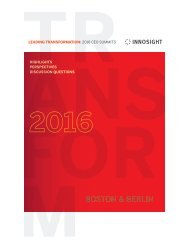TECHNOLOGY AT WORK
1Oclobi
1Oclobi
Create successful ePaper yourself
Turn your PDF publications into a flip-book with our unique Google optimized e-Paper software.
20<br />
Citi GPS: Global Perspectives & Solutions February 2015<br />
Figure 8. Employment growth in the United States reflecting job polarisation<br />
annual percent change<br />
3<br />
2<br />
1<br />
0<br />
1983-2000<br />
2000-2007<br />
2007-2014<br />
Non-routine Cognitive Routine Cognitive Routine Manual Non-routine Manual<br />
-1<br />
-2<br />
High-skill Medium-skill Low-skill<br />
Source: Valletta (2015) Note: Employment categories are based on the author’s calculations of BLS data from the<br />
Household Survey<br />
Job polarisation is an issue not just in the<br />
US, but across Europe as well<br />
Figure 9 suggests that the US experience of job polarisation is not unique. Across a<br />
broad swath of advanced economies, occupations at the middle of the skills<br />
spectrum – under the assumption that these occupations pay average wages –<br />
have fallen as a share of total employment, whereas occupations at low or high skill<br />
classifications have gained. The data are not as granularly defined as those in<br />
Figure 8, which again separates routine job tasks from non-routine ones, but they<br />
do lend support to the hypothesis that the phenomenon of automation carving out<br />
jobs at the middle of the skill distribution is occurring globally.<br />
Figure 9. Change in employment shares by occupation, 1993-2006<br />
20<br />
15<br />
10<br />
Percentage Point Change in Employment Shares<br />
Low Wage Middle Wage High Wage<br />
5<br />
0<br />
-5<br />
-10<br />
-15<br />
-20<br />
Portugal<br />
Ireland<br />
Finland<br />
Norway<br />
Netherlands<br />
Greece<br />
United Kingdom<br />
Sweden<br />
Germany<br />
Spain<br />
Belgium<br />
Denmark<br />
France<br />
Austria<br />
Italy<br />
United States<br />
Source: Autor (2010). Note: Wage categories are based on average wage levels at the start of the period measured<br />
© 2015 Citigroup










